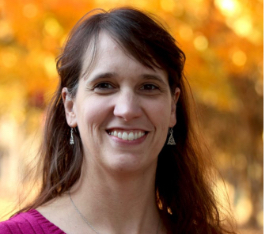The Catholic College of the South
Dr. Heather Ayala



Meet Dr. Heather Ayala
OF NOTE:
I have a passion for teaching Biology. This has led me to help teach Homeschool high school Biology classes as well as write and publish Biology texts for both the high school and elementary school levels. My passion for teaching has been noted by colleagues and students such that I was the recipient of the Belmont Abbey College Adrian Teaching Award in spring of 2022.
KNOWN FOR:
I am known for being tough, but fair. I have clear expectations and hold my students to a high standard.
WHEN NOT IN THE CLASSROOM, CAN OFTEN BE FOUND:
Spending time with my husband and four children. I enjoy good food, good music, sewing, and reading.
Examples of classes taught by Heather Ayala:
- General Biology
- Invertebrate Zoology
- Organismal Diversity
- Parasitology
- Research Methods
- Anatomy & Physiology
- BS. Biology, Azusa Pacific University
- PhD. Biological Sciences, University of Notre Dame
Publications
- Ayala, Heather and Katie Rogstad. 2019. General Biology. Novare Science & Math.
- Reilly, H., H. Wang, J. Steuter, A. Marx, & M. Ferdig. International Journal for Parasitology. 2007.
Quantitative dissection of clone-specific growth rates in cultured malaria parasites. 37 (14): 1599-607. - Reilly Ayala, H., MA Wacker, G. Siwo, MT Ferdig, BMC Genomics. 2010. Quantitative trait loci mapping reveals candidate pathways regulating cell cycle duration in Plasmodium falciparum. 11: 577.
Presentations
- Poster presentation: “Comparative growth analysis of malaria parasite, Plasmodium falciparum, using 3H-Hypoxanthine incorporation and SYBR green fluorescence.” Abstract 236. Katherman, K., A. Goldys, D. Champagne, H. Reilly Ayala. American Society of Tropical Medicine and Hygiene (ASTMH), New Orleans, LA. November 2-6, 2014.
- Poster presentation: “Integrating quantitative trait loci (QTL) with whole-genome data to identify candidate genes controlling growth traits in Plasmodium falciparum.” Abstract 160. Reilly, H., M. Wacker, A. Tan, J. Gonzales, & M. Ferdig. American Society of Tropical Medicine and Hygiene (ASTMH), Philadelphia, PA. November 4-8, 2007.
- Poster presentation: “Genetic dissection of differential growth rates in Plasmodium falciparum in chloroquine resistant and sensitive progeny clones.” Abstract 319. Reilly, H., H. Wang, K. Wong, R. Easley, & M. Ferdig. American Society of Tropical Medicine and Hygiene (ASTMH), Washington D.C. December 11-15, 2005.
- Paper presentation: “Differential growth rates in Plasmodium falciparum in chloroquine resistant and sensitive progeny clones.” Reilly, H., H. Wang, K. Wong, R. Easley, R. Cooper, & M. Ferdig. Young Investigator Award. American Society of Tropical Medicine and Hygiene (ASTMH), Washington D.C. December 11-15, 2005.
- Poster presentation: “Genetic dissection of differential growth rates in Plasmodium falciparum.” Abstract 278. Reilly, H., H. Wang, J. Patel, J. Steuter, B. Deng, & M. Ferdig. American Society of Tropical Medicine and Hygiene (ASTMH), Miami, FL. November 7-11, 2004.
- Poster presentation: “Growth differences in two lines of Plasmodium falciparum.” No abstract number. Reilly, H., H. Wang, J. Steuter, J. Patel, B. Deng & M. Ferdig. Chicago Area Mycology and Parasitology (CAMP), Northwestern University Chicago, IL. September 2004.
- Poster presentation: “Dissecting the heritable components of growth in erythrocyte-cultured Plasmodium falciparum parasites.” Abstract 275C. Reilly, H., J. Steuter, J. Patel, B. Deng, & M. Ferdig. Molecular Parasitology Meeting, Woods Hole, MA. September 14-18, 2003.
Professional Memberships
- American Society of Tropical Medicine and Hygiene (2012-2015)
- Sigma Zeta National Science and Math Honor Society (2014-present)
- Plasmodium falciparum (Malaria parasite) & Genomics
- Biology education
- Teaching Biology
- Classical education
Dissertation: The genetic dissection of differential growth in Plasmodium falciparum and its relationship to chloroquine drug selection
Laboratory research, University of Notre Dame, 2002-2007

